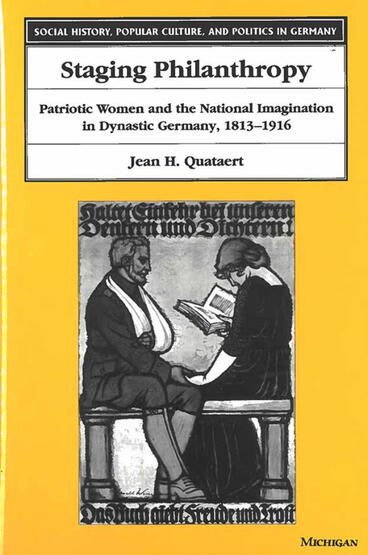Staging Philanthropy
Patriotic Women and the National Imagination in Dynastic Germany, 1813-1916
Patriotic Women and the National Imagination in Dynastic Germany, 1813-1916
Description
Staging Philanthropy is a history of women's philanthropic associations during Germany's "long" nineteenth century. Challenged by the French Revolution and the Napoleonic occupation and war, dynastic groups in Germany made community welfare and its defense part of newly-gendered social obligations, sponsoring a network of state women's associations, philanthropic institutions, and nursing orders which were eventually coordinated by the German Red Cross. These patriotic groups helped fashion an official nationalism that defended conservative power and authority in the new nation-state.
An original and truly multi-disciplinary work, Staging Philanthropy uses archival research to reconstruct the neglected history of women's philanthropic organizations during the 'long' nineteenth century. Borrowing from cultural anthropologists, Jean Quataert explores how meaning is created in the theater of politics. Linking gender with nationalism and war with humanitarianism, Quataert weaves her analysis together with themes of German historiography and the wider context of European history.
Staging Philanthropy will interest readers in German history, women's history, politics and anthropology, as well as those whose interest is in medicalization and the German Red Cross. This book situates itself in the middle of a string of debates pertaining to modern German history and, thus, should also appeal to readers from the general educated public.
Jean Quataert is Professor of History and Women's Studies, Binghamton University. She has previously published a number of books, including Connecting Spheres: European Women in a Globalizing World, 1500 to the Present with Marilyn J. Boxer (Oxford, 1999).
Jean Quataert is Professor of History and Women's Studies, Binghamton University. She has previously published a number of books, including Connecting Spheres: European Women in a Globalizing World, 1500 to the Present with Marilyn J. Boxer (Oxford, 1999).
Reviews
"Jean H. Quataert has written a provocative book that helps us rethink the rise of the modern state and the development of nation and nationalism in gendered terms. She focuses on the growth of philanthropy in nineteenth-century German society and argues that through philanthropic organizations---primarily women's associations and the closely related Red Cross---women participated in important and hitherto ignored ways in the construction of state and nation. . . . Quataert takes the women's associations as raw material to make a series of broader claims. The first is that philanthropy, far from being a simple tool of social discipline, was in fact at the heart of dynastic ritual. . . . These are important and original arguments, and historians will be forced to grapple with them."
- Helmut Walser-Smith
---Helmut Walser-Smith, American Historical Review, December 2002
"Both its engaging subject matter and its innovative interpretive framework make this an important contribution to the history of German states, women's organizations, and conceptions of citizenship during the long nineteenth-century."
- Ann Taylor Allen, University of Louisville
---Ann Taylor Allen, University of Louisville, Central European History, Volume 36, No. 1 (2003)
"Through her sophisticated study of women's philanthropy during this period, Quataert demonstrates the role of philanthropy in constructing the modern state and an imagined national community in Germany, and the centrality of the German dynasties themselves to this process. In so doing, she opens up the whole question of female involvement in German nation-state formation. Rather than looking at the activities of women in isolation, Quataert sets them compellingly in the 'male' context of state-building, popular politics and the public sphere."
- Abigail Green, Brasenose College, Oxford
---German History

